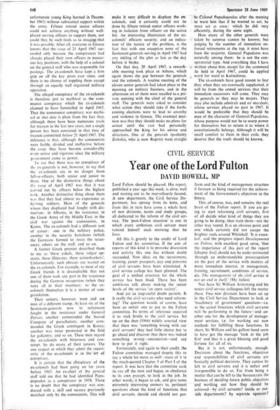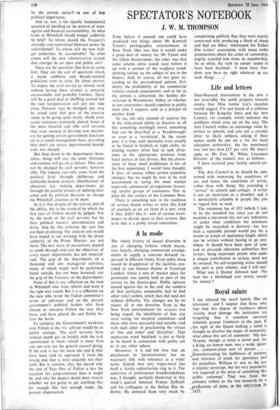Year one of the Lord Fulton
CIVIL SERVICE DAVID HOWELL, MP
Lord Fulton should be pleased. His report, published a year ago this week, is alive, well and turning out to be marvellously fecund. A new department, the Civil Service De- partment, has sprung from its loins, and from this in turn have come a whole host of new divisions, teams and study groups, all dedicated to the reform of the civil ser- vice. The 'post-Fulton situation' is one in which every ambitious civil servant must remind himself each morning that he lives.
All this is greatly to the credit of Lord Fulton and his committee. If the aim of reports of this kind is to provoke discussion and activity this one has without doubt succeeded. New ideas on the recruitment, training, career prospects, pay and pensions of civil servants have been stimulated. A civil service college has been planned. The goal of a unified structure for the whole service has been fixed. There has been ambitious talk about making the senior levels of the service 'an open society'.
And yet an ungrateful doubt persists. Is it really the civil servants who need reform- ing? The question would, of course, have been an unfair one to put to the Fulton committee. Its terms of reference required it to stick firmly to the civil service. Set up on the then (1966) widely asserted view that there was 'something wrong with our civil servants' they had little choice but to go ahead and discover that there was indeed something wrong—amateurism—and say how to put it right.
Fortunately, and again to their credit, the Fulton committee managed despite this to say a whole lot more as well—most of it in the much-quoted Chapter 5 of Part I of the report. It was here that the committee took its eye off the men and began, in obedience to its own precept, to look at the job. In other words, it began to ask, and give some extremely interesting answers to, pertinent questions about the kind of functions that civil servants should and should not per- form and the kind of management structure it foresaw as being required for the achieve- ment of the Government's objectives in the future.
This, of course, was, and remains, the real heart of the Fulton report. If you are go- ing to start reforming civil servants, first of all decide what kind of things they are going to be doing; then train them—not the other way round. It is an obvious point and one which certainly did not escape the brighter souls around Whitehall. 'It is essen- tial', said the progress report Developments on Fulton, with excellent good sense, 'that the importance of this part of the report [chapter five] should not be under-estimated through an understandable preoccupation on the part of the service with matters of more immediate interest, in management, training, recruitment, conditions of service, etc. The management of the civil service is not an end in itself.' (My italics).
Nor have Sir William Armstrong and his senior civil service colleagues left the matter there. Two new divisions have been set up in the Civil Service Department to look at 'machinery of government' questions—i.e. at the actual functions which civil servants will be performing in the future—and an- other one for the development of manage- ment services, i.e. for working out new methods for fulfilling those functions. In short, Sir William and his gallant band seem to have got the message 'look at the job first' and that is a great blessing and good fortune for all of us.
But it is not, unfortunately, enough. Decisions about the functions, objectives and responsibilities of civil servants are basically political decisions. They cannot be left to civil servants and it is unfair and irresponsible to do so. Far from being a matter that can be left to the bureaucrats. the business of deciding future public objectives and working out how they should be achieved—by civil servants? inside or out- side departments? by separate agencies?
by the private sector?—is one of key political importance.
And so, too, is the equally fundamental question of deciding on the pattern of man- agerial and financial accountability. At what levels in Whitehall should budget authority be held? To whom should the Treasury's absurdly over-centralised financial power be redistributed? To whom will the new bud- get authorities be accountable? To what extent will the new administrative system that emerges be an open and public one?
These are the questions that have to come first. They are the sort of questions which it needs stubborn and bloody-minded politicians even to raise, let alone answer. To expect the civil service to reform itself without having these answers is certainly unreasonable and probably fruitless. There will be a good deal of shuffling around but the real reorganisation will just not take place. Pensions may be changed, pay may be raised (and that part of the exercise seems to be going quite nicely, thank you), career structures nominally altered. Some of the most forceful and able civil servants may even succeed in devising new machin- ery for getting certain government functions on to a sound management basis, providing they don't cut across departmental bound- aries too sharply.
But deep down in the departments them- selves, things will stay the same. Attitudes and routines will go on as before. They can- not be changed by civil servants, however able. The impetus can only come 6om the political level through deliberate and politically-backed analysis, identification of objectives (i.e. making departments go through the painful process of defining their aims) and by political decisions to change the Whitehall structure to fit them.
So it is that despite all the activity and all the ability, this is the standard by which the first year of Fulton should be judged. Not by the work of the civil servants but by their political masters' determination and drive. And by this criterion the year has not been promising. The analysts one would have hoped to see working with the direct authority of the Prime Minister are not there. The new wave of accountants needed to comb through and cost the objectives of every major departments has not material- ised. The grip of the departments on a thousand and one managerial activities, many of which might well be performed better outside, has not been loosened, nor the grip of the Treasury on the departments.
None of this is any reflection on the men in Whitehall who want reform and want it the right way round. But it is a reflection on the men who wrote the Fulton committee's terms of reference and on the present government's political leaders who have chosen to interpret Fulton the way they have, and have placed the cart firmly be- fore the horse.
To compare the Government's weakness over Fulton to the TUC sell-out would be an unfair analogy. The civil servants have without doubt got on briskly with the task apportioned to them—which is more than one can ever see the general council doing. If the task is not the main one and if they have been told to approach it from the wrong end, that is most certainly not their fault. But it remains, alas, the reason why the end of Year One of Fulton is less the occasion for congratulation than it might be, and why the deepest doubt must remain whether we are going to get anything like far enough like fast enough under the present dispensation.



































 Previous page
Previous page